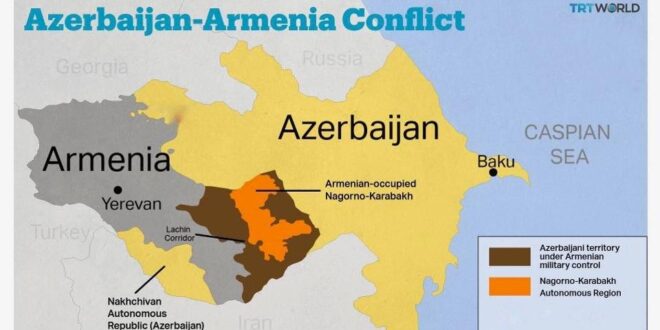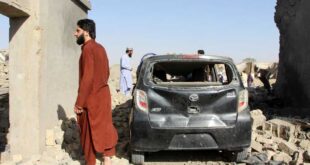Farzad Ramezani Bonesh
Senior Researcher and Analyst of International Affairs
The Republics of Azerbaijan and Armenia have been embroiled in a military conflict in the Nagorno-Karabakh region for more than a month. During this time, they agreed three times on a ceasefire and a humanitarian ceasefire, but each time the agreement was violated and the conflict resumed.
But finally, Armenian Prime Minister Nikol Pashinyan announced that he had signed an agreement with Russia and the Republic of Azerbaijan to end the war in Nagorno-Karabakh. The following article evaluates the agreement reached between Yerevan, Russia and the Republic of Azerbaijan.
-From the Pashinyans’ point of view, this document doesn’t include a meaningful solution to the Nagorno-Karabakh conflict. It just means an end to the war in Nagorno-Karabakh. Therefore, the Nagorno-Karabakh conflict has not been resolved before and is still unresolved.
From the Armenia’s point of view, by considering the deplorable situation of the war fronts, the unsettled situation of the army in Karabakh and the war against the Turkish-Azerbaijani forces, and an army which was not fully supported, the agreement was just a bad choice to avoid a worse option.
– With this agreement, Yerevan is hopeful that by removing the blockade of all regional roads and the possibility of creating a railway between Iran and Armenia, along with the presence of Russian peacekeepers, to guarantee the security of Karabakh residents and the stability of the road connection between Stepanakert and Yerevan and the stability of the country.
– In fact, the current government of Armenia hopes to manage most parts of Karabakh by rebuilding itself under the Russian flag and its military support with the current plan of the Artsakh Republic Agreement. In this sense, even if the West and Europe do not recognize it soon, the region will continue its political life, like South Ossetia and Abkhazia.
– The Armenian government will try to thwart Turkey’s efforts to strengthen its presence in the region as a peacekeeping force. As Russia has previously stated, Turkey’s participation in the Joint center for monitoring the ceasefire has nothing to do with peacekeeping operations, and it is Moscow that is to play a role alone. On the other hand, since Yerevan considers Turkey as a country which has a key role in planning, inciting, using foreign armed terrorists, and carrying out Azerbaijan’s war against Artsakh, it doesn’t accept Ankara as a neutral actor.
– In fact, the Armenian government hopes that the citizens of Azerbaijan, who left their lands after the occupation, will return to their homes under the supervision of the UN High Commissioner for Refugees, The Armenian residents of Karabakh, either shouldn’t have to take refuge in the main territory of Armenia this time.
-Because the Lachin corridor is a two-way Armenian-Armenian corridor and the Moghari transit route will remain Azeri-Azeri, Armenia does not want this axis to be a major opportunity for a wider Turkish presence in the region. In fact, the connection of Nakhchivan with Azerbaijan through a corridor will mean the connection of Azerbaijan to Turkey, which will be geopolitically very important and will reduce the geopolitical position of Armenia.
– Many in Yerevan believe that a long-lasting war and the fatigue of the military forces and the continuation of the war could have led to the capture of Stepanakert (Khan Kennedy) and the complete fall of Nagorno-Karabakh and the political collapse in Armenia. Therefore, the tripartite agreement is a worse option than a bad one in the absence of a serious European and American view of supporting Yerevan.
Therefore, costly governing of those seven peripheral areas of Nagorno-Karabakh in exchange for signing an agreement for the survival of Nagorno-Karabakh outside its control is not a bad option in the current situation.
– It seems that Yerevan believes that even if the United States and France want to activate the Minsk Group, they should challenge the agreement. In these circumstances, without the presence and will of Russia, it is not possible to disrupt the current situation or create a new form of relations in the region.
– In fact, in the eyes of many in Yerevan, in spite of the insufficient support of Moscow for Armenia along with the military superiority of the Republic of Azerbaijan over Armenia with the help of Turkey, about 2,000 Russian peacekeepers could monitor the ceasefire. Under these circumstances, following the ceasing of the conflict in Nagorno-Karabakh, Armenia will try to do not ignore the Red Line or the right of Nagorno-Karabakh to determine its own destiny, and pursue it in the international community.
– Nikol Pashinyan and other Armenian leaders hope that US President-elect Joe Biden will pay more attention to the US role in resolving the Nagorno-Karabakh conflict as co-chair of the OSCE Minsk Group.
Because Biden’s positive view of the Armenian-American friendship, the recognition of the Armenian genocide and the protection of its rights can be an opportunity for Armenia to fully resolve this issue, ensure security and the right to self-determination of the people of Karabakh, along with the pressure on Turkey.
-Although opponents of the government believe that Armenia, led by Pashinyan, failed in the war and that a failed politician cannot be the leader of a nation, the government, none of the resignation of Pashinyan, the suspension of the ceasefire agreement, and the changing of terms of the trilateral agreement, seem real.
Vision:
The nine-article agreement is not a peace agreement but a ceasefire agreement to reach a lasting agreement on Nagorno-Karabakh. However, there are serious doubts about its continuation. Because one side of it, Armenia, feels defeated and there is a lot of pressure on the government. There is no provision or understanding in the agreement about Nagorno-Karabakh. However, it is unlikely that the opposition will be able to rescind or amend the agreement even if a government is formed.
 Geostrategic Media Political Commentary, Analysis, Security, Defense
Geostrategic Media Political Commentary, Analysis, Security, Defense





